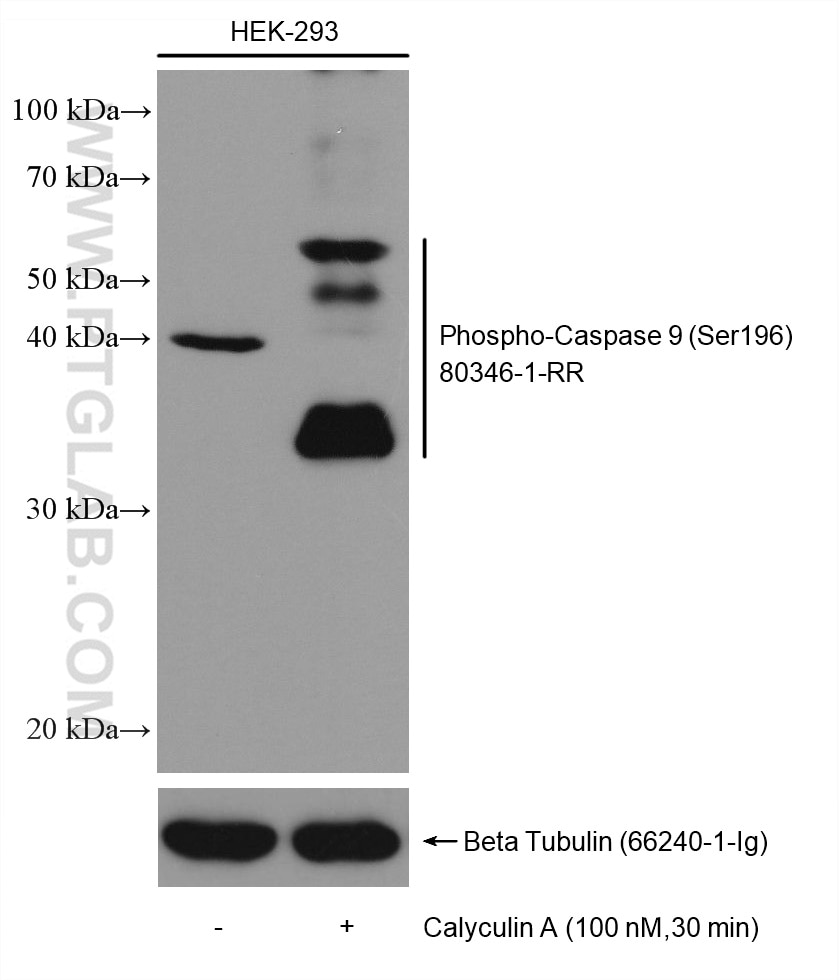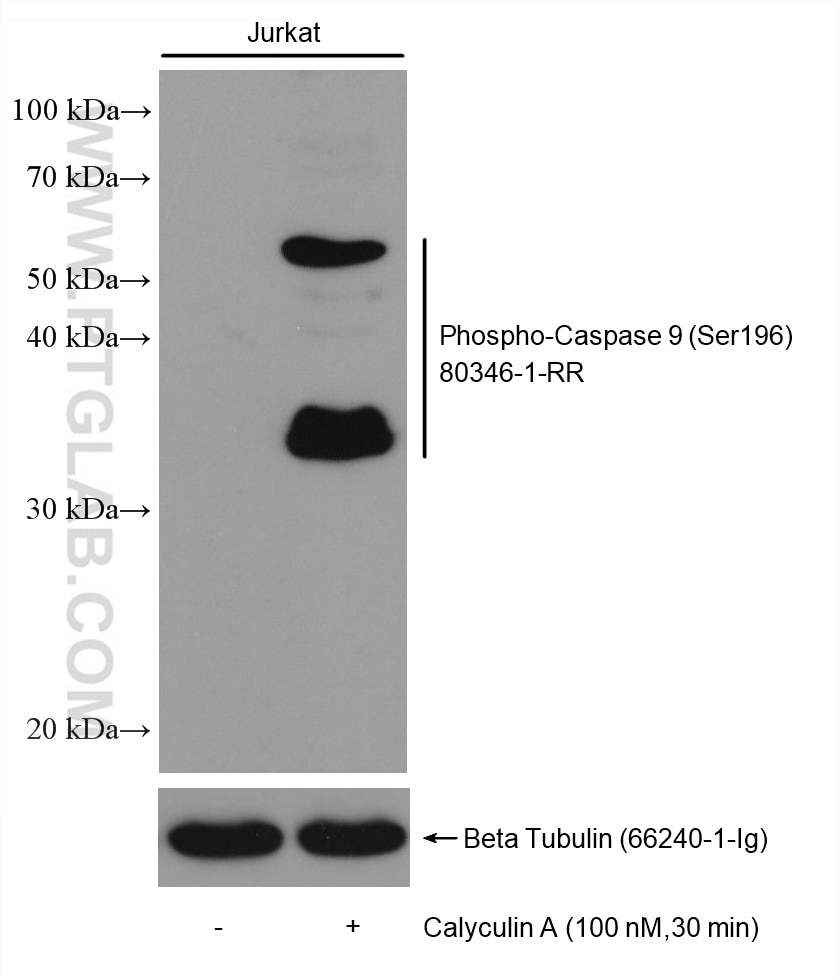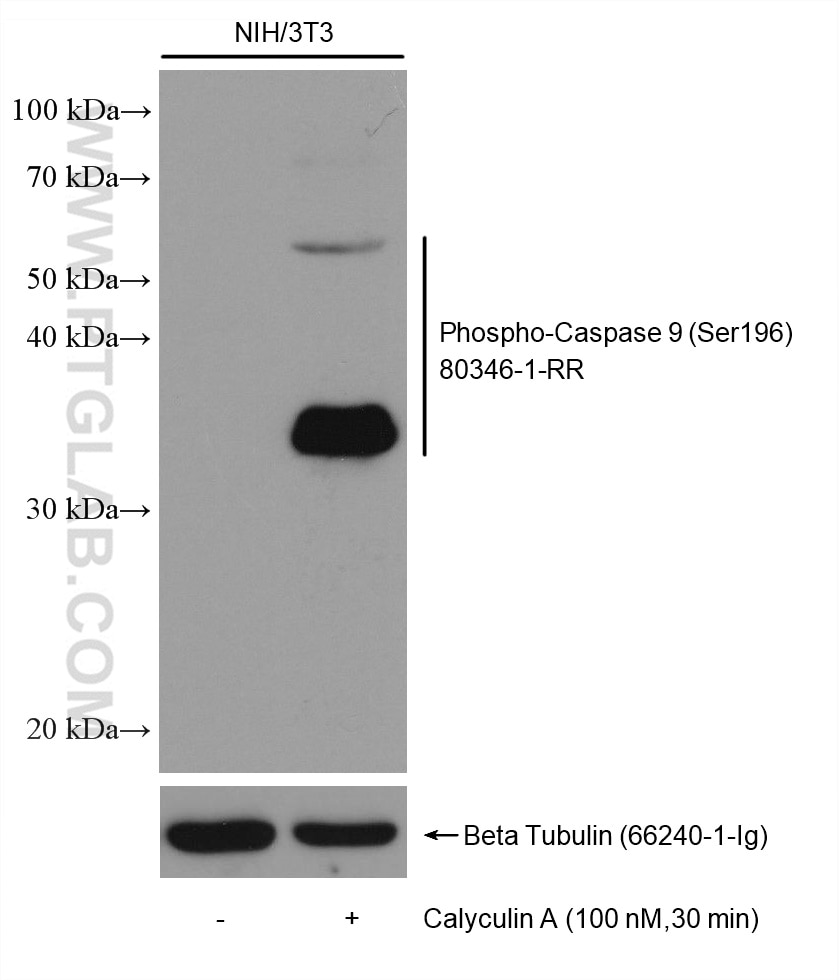Phospho-Caspase 9 (Ser196) Rekombinanter Antikörper
Phospho-Caspase 9 (Ser196) Rekombinant Antikörper für WB, ELISA
Wirt / Isotyp
Kaninchen / IgG
Getestete Reaktivität
human, Maus
Anwendung
WB, ELISA
Konjugation
Unkonjugiert
CloneNo.
3P16
Kat-Nr. : 80346-1-RR
Synonyme
Galerie der Validierungsdaten
Geprüfte Anwendungen
| Erfolgreiche Detektion in WB | NIH/3T3-Zellen, HEK-293-Zellen, Jurkat-Zellen, Mit Calyculin A behandelte HEK-293-Zellen, mit Calyculin A behandelte Jurkat-Zellen, mit Calyculin A behandelte NIH/3T3-Zellen |
Empfohlene Verdünnung
| Anwendung | Verdünnung |
|---|---|
| Western Blot (WB) | WB : 1:2000-1:10000 |
| It is recommended that this reagent should be titrated in each testing system to obtain optimal results. | |
| Sample-dependent, check data in validation data gallery | |
Produktinformation
80346-1-RR bindet in WB, ELISA Phospho-Caspase 9 (Ser196) und zeigt Reaktivität mit human, Maus
| Getestete Reaktivität | human, Maus |
| Wirt / Isotyp | Kaninchen / IgG |
| Klonalität | Rekombinant |
| Typ | Antikörper |
| Immunogen | Peptid |
| Vollständiger Name | caspase 9, apoptosis-related cysteine peptidase |
| Berechnetes Molekulargewicht | 46 kDa |
| Beobachtetes Molekulargewicht | 46 kDa, 35 kDa |
| GenBank-Zugangsnummer | BC002452 |
| Gene symbol | CASP9 |
| Gene ID (NCBI) | 842 |
| Konjugation | Unkonjugiert |
| Form | Liquid |
| Reinigungsmethode | Protein-A-Reinigung |
| Lagerungspuffer | PBS mit 0.02% Natriumazid und 50% Glycerin pH 7.3. |
| Lagerungsbedingungen | Bei -20℃ lagern. Aliquotieren ist bei -20oC Lagerung nicht notwendig. 20ul Größen enthalten 0,1% BSA. |
Hintergrundinformationen
Caspase 9 also name as MCH6, APAF3, APAF-3, ICE-LAP6 and CASPASE-9c, is a member of the cysteine-aspartic acid protease (caspase) family. It's synthesized as a 46kDa precursor protein which can be cleaved into a 35kDa subunit and a 11kDa subunit. The phosphorylated type can be detected at 55kDa and 35kDa. It plays a central role in the mitochondrial or intrinsic apoptotic pathway that is engaged in response to many apoptotic stimuli. Once activated, caspase-9 cleaves and activates the effector caspases 3 and 7 to bring about apoptosis. It can be phosphorylated by PKB/AKT1 at Ser196, this modification will downregulate its activity and decrease apoptosis. Akt phosphorylation site found in human caspase 9 is absent in mouse caspase 9.It's reported that there is an increase in caspase 9 expression and activity in the hypoxic brain. Inhibition of Caspase 9 activity would render opportunity to treat neurological diseases such as stroke, neurodegenerative diseases or brain injury caused by hypoxia. (PMID: 19788417, PMID: 10529400, PMID: 9812896, PMID: 18840507) In recent years, the localization of caspase9 was a focus of interest. Beside its cytoplasmic distribution, a very extensive localization study was done on rat brain tissue, where caspase9 was found located predominantly in the nucleus and to a lesser extend in the cytoplasm [PMID: 15541731].
Protokolle
| Produktspezifische Protokolle | |
|---|---|
| WB protocol for Phospho-Caspase 9 (Ser196) antibody 80346-1-RR | Protokoll herunterladen |
| Standard-Protokolle | |
|---|---|
| Klicken Sie hier, um unsere Standardprotokolle anzuzeigen |




